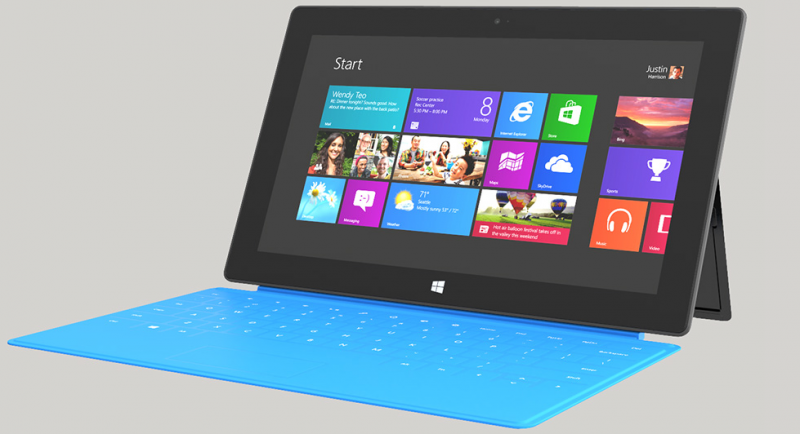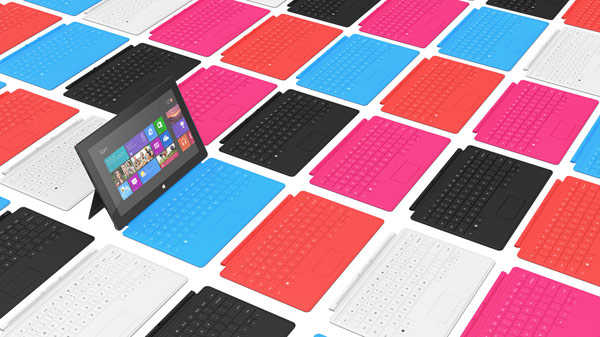Like it did a few decades ago, Microsoft is trying to once again shake up personal computing and home entertainment, in a bid to catch up with Apple and Google. Recently it launched the Windows 8 era, headlined by a tablet-laptop hybrid called Surface.
Microsoft’s new device runs on both Windows RT and Windows 8 Pro operating systems. It features a 10.6-inch screen, a patented magnesium alloy casing, a sturdy Kickstand, a pressure-sensitive Touch Cover, and – on the software side of things – a set of touch-enhanced versions of Microsoft’s popular office suites, including Word, Excel, and PowerPoint.

A potentially great addition to consumers’ home theater and home entertainment systems, Surface is also designed for easy integration with other Microsoft products like Xbox, Xbox Music, OneNote, and cloud-based SkyDrive. Recently Microsoft announced the availability of its new PC, Surface, in the US, Canada, Australia, China, France, Germany, and the UK. But will this new baby be the iPad killer that many have claimed it would be? Let’s check out what tech reporters and online reviewers have to say.
Walt Mossberg, AllThingsD:
“I have been testing the Surface almost daily for three weeks and I like it. It’s beautifully and solidly built and it’s the purest expression of Microsoft’s new Windows 8 touchscreen operating system which, like the Surface, goes on sale on Friday. The new operating system also works on laptops and desktops. It can be operated with a mouse or touch pad, but it’s dramatically different, touch-optimized user interface begs to be used on a touchscreen tablet.”
Zach Epstein, CNN Money:
“Microsoft is the biggest software company in the world, but its first piece of Windows hardware is a beauty. The Surface is light and portable, and its battery gave me a full day of usage without a problem. Functions such as streaming video will cut that down, but you’ll still go longer between charges than you would with any popular Windows or Mac laptop.”

Mathew Honan, Wired.com:
“This is a great device. It is a new thing, in a new space, and likely to confuse many of Microsoft’s longtime customers. People will have problems with applications — especially when they encounter them online and are given an option by Internet Explorer to run them, only to discover this won’t work. But overall it’s quite good; certainly better than any full-size Android tablet on the market. And once the application ecosystem fleshes out, it’s a viable alternative to the iPad as well.”
Joshua Topolsky, The Verge:
“The promise of the Surface was that it could deliver a best-in-class tablet experience, but then transform into the PC you needed when heavier lifting was required. Instead of putting down my tablet and picking up my laptop, I would just snap on my keyboard and get my work done. But that’s not what the Surface offers, at least not in my experience. It does the job of a tablet and the job of a laptop half as well as other devices on the market, and it often makes that job harder, not easier. Instead of being a no-compromise device, it often feels like a more-compromise one.”
Sam Biddle, Gizmodo:
“Should you buy it? No. The Surface, with an obligatory Touch Cover, is $600. That’s a lot of money. Especially given that it’s no laptop replacement, no matter how it looks or what Microsoft says. It’s a tablet-plus, priced right alongside the iPad and in most ways inferior.”
Matt Buchanan, Buzzfeed:
“Surface is a beautiful, substantial and muscular piece of hardware. It’s not as elegant, not as insistent on its ability to disappear as an iPad, but it’s just as thoughtful, in a different way. It revels in its physicality — that what makes it different is that it can physically transform into something more than a tablet, though it can be something so much less than a laptop when it needs to be, thanks to the built-in kickstand and Microsoft’s Touch Cover. The irony here is that Microsoft, a software company, has mostly nailed the hardware but fallen down when it comes to the software. The deeper irony still is that what matters more and more with devices like Surface is the software, apps and ecosystem that go into and surround the device — not the hardware itself, beyond its ability to be a stage for the software.”

